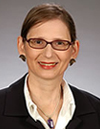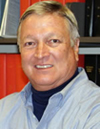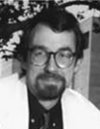Academy of Distinguished Teaching Scholars (ADTS) - 2006 Inductees
Academy of Distinguished Teaching Scholars: 2006 Inductees
The Provost announces the 2006 inductees into the University of Florida's Academy of Distinguished Teaching Scholars
-
Dr. Linda Behar-Horenstein
Professor, Department of Educational Administration & Policy
College of Education
-
Dr. Paul Doering
Distinguished Service Professor
College of Pharmacy
-
Dr. James W. Lynch
Professor, Department of Hematology/Oncology
College of Medicine
-
Dr. Rick Rudd (No longer at the University of Florida)
Associate Professor, Department of Argicultural Education & Communication
College of Agricultural and Life Sciences/IFAS
-
Dr. Gregory Ulmer
Professor, Department of English
College of Liberal Arts and Sciences
These outstanding educators have demonstrated sustained innovation and commitment to teaching throughout their careers. They also have articulated their vision for promoting excellence across campus to the faculty committee that reviewed nominees to the Academy. To assist them in advancing their vision for excellence and faculty enhancement at the University, this year's Academy teacher-scholar awardees will serve for three years on the advisory board for Faculty Development.
In this capacity they will assist the Associate Provost in developing programs and workshops that enhance the professional careers and experiences of faculty. As teaching and learning advocates, Academy members also promote a university-wide discourse on key issues surrounding the development of teaching at the University.
After completing their three-year terms on the advisory board, members will retain the title of Distinguished Teaching Scholar and continue to be a part of the Academy.
 |
Linda S. Behar-Horenstein
Professor, College of Education
Doctor of Curriculum and Instruction, Loyola University of Chicago, 1992
Teaching Philosophy Excerpt: I believe that when provided with the right learning experiences, feedback, and mentoring, that students can attain their goals. Welcoming students to the learning environment, encouraging them to find their voice as emergent scholars, inviting their curiosity, and holding them accountable for their learning and thinking are some of the characteristics that define the spaces where we work together. Teaching is a reciprocal relationship that takes place in a contextualized community. I learn from my students just as they have learned from me. While working with students I encourage them to find their voice and to discover their own potential. I have been privileged to watch many graduate students develop into thoughtful and capable researchers.
Academy Pedagogical Pointer: To promote student ownership for learning, I provide many opportunities for students to talk about the subject matter that they are learning. When used effectively, these interactions help to crystallize learning. Student interaction is invited, encouraged, and respected. Class sessions are often lively and passionate as students share diverse views about schools. Questions for critical reflection, interspersed throughout presentations, are used strategically to promote student engagement. I also remain attentive to students' non-verbal and verbal communications. If I see that a student looks puzzled or sense that students do not seem to understand an idea, I pause to check in with them. If my hunch is correct then I re-teach or explain the concept in another way. To ensure the continuity of progress of my students, I provide extensive written feedback on students' work in a timely manner. I also encourage students to set-up a timely face-to-face meeting to discuss their reactions, concerns, or questions about the feedback. Thus I am highly accessible to the students that I teach.
|
 |
Paul Doering
Distinguished Service Professor, College of Pharmacy
Master of Science in Clinical Pharmacy, University of Florida, 1975
Teaching Philosophy Excerpt: Teachers must never forget what it is like to be a student. As a small child my mother used to take me to Barber College for discount haircuts because money was tight in our family. The haircuts weren’t perfect but I always tried to remember that these people were still learning. I have tried to carry that concept with me as a philosophy toward college teaching: our students are works in progress. Indeed, I have tried to remember this in my frequent dealings with students in other colleges, such as student journalists writing news stories for their writing classes. Sometimes this requires great patience and understanding, but we must remember that they are still learning.
Academy Pedagogical Pointer: I learned only after nearly 20 years on the faculty that, in order to improve one’s teaching, one must be willing to take chances. There is a tremendous risk in leaving one’s comfort zone to try something new. Some things you try bring great rewards, while others are utter failures. One thing is for sure, however: as long as you are sitting in one place you can never move forward.
|
 |
James W. Lynch
Professor, College of Medicine
Doctor of Medicine, Eastern Virginia Medical School, 1984
Teaching Philosophy Excerpt: Teaching, at any level, implies the communication of either information or skills from one individual to another. In the specific setting of medical school, both are critical if we are to achieve our goal of educating physicians who are both competent and compassionate. Creative strategies are needed to enhance learning the ever increasing volume of medical information while at the same time promoting a means of integrating this information into a fluid and useful body of knowledge. This task is further complicated by the reality that our patients emerge from a vast array of social, educational, religious and ethnic backgrounds requiring the physician to know something about each of these areas. Many evolving forces including changes in the healthcare system as well as the complexities of patient care and research, require the medical educator to have a clear grasp of the how humans think and insight into learning strategies.
Academy Pedagogical Pointer: As an educator who has a hand in teaching students from the basic sciences, to clinical sciences and beyond into graduate medical education, it will always be my desire to bring a precise knowledge of the science of medicine together with an understanding of the human experience. During the second year, I invite patients to come into the class to discuss the impact of cancer on their lives and the lives of their families. Furthermore, I use cinema, specifically, the films Wit and The Doctor to illustrate the potential pitfalls of a large academic medical center. During the 3rd year, I have developed an effective and popular problem based learning exercise to facilitate the development of working knowledge and try to model the best kinds of patient-physician relationships in the clinics. As the director of the fellowship program, I stressed the importance of having sufficient basic and working knowledge to make the best recommendations to patients and once again use the humanities to highlight the human side of disease.
|
|
|
Rick Rudd
Associate Professor, College of Agricultural and Life Sciences
Doctor of Vocational and Technical Education, Virginia Polytechnic Institute and State University, 1994
Teaching Philosophy Excerpt: Critical thinking research has had a significant impact on my teaching. I began in my role of teacher at the University of Florida with a degree in education, seven years of experience as a high school teacher, and a great deal of confidence in my ability to teach. Unfortunately, I did not realize the difference between preparing an educated student and an informed student. My expertise at the time was in preparing an informed student. Over the years, I began to realize that providing students with information and lower-level cognitive skills of remembering ad processing was not enough to prepare them for career success. They needed much more. This led me to begin reading and eventually conduct my own research in teaching for critical thinking. I do believe that my courses today do provide students with the knowledge, skills and dispositions to think critically about professional decisions and problems in and out of my classroom.
Academy Pedagogical Pointer: I have developed and adopted a number of techniques to teach for critical thinking, including critical thinking journals, concept matrices, critical article critiques, Socratic questioning, elements of reasoning, and international thinking standards. These techniques are embraced by my students and colleagues. They do make a difference in student learning as evidenced by student testimony and quantitative research. My interest in critical thinking led me to develop a web-site dedicated to teaching for critical thinking that people from across the United States and literally world-wide have utilized.
|
 |
Greg Ulmer
Professor, College of Liberal Arts and Sciences
Doctor of Comparative Literature, Brown University, 1972
Teaching Philosophy Excerpt: The motto guiding my teaching and research is borrowed from the Japanese poet Basho, who advised “not to follow in the footsteps of the masters, but to seek what they sought.” This vision was learned from the “masters” themselves, acquired by the fortunate circumstances of my career at UF.
Academy Pedagogical Pointer: A commonplace of education is that there are at least two major dimensions of knowledge: one of discovery, and the other of validation. Education in the era of literacy has emphasized validation, proof, the transmission of what is already known and confirmed. The process by which knowledge is invented is acknowledged to be dramatically different from how it is confirmed, but this discovery stage is widely considered to be unteachabble and is therefore left out of conventional education. My assumption is that creativity may be taught, that it is a mode of reasoning amenable to method, and that new media technology is especially supportive of this mode.
|






